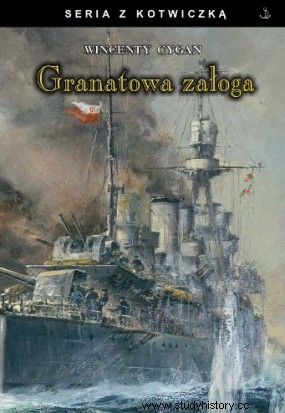A career in the navy was arduous and progressed through many levels. Every sailor who rose to the ranks of non-commissioned officers and officers was proud of himself. At least as long as during World War II the Polish admiralty cut out a nice number of non-commissioned officers serving in England. At first it sounded like a minor mistake in translation ...
Just before the outbreak of World War II, three most modern destroyers were delegated from Poland to British ports:ORP "Błyskawica", ORP "Burza" and ORP "Grom", along with their crews. Polish sailors proudly served on their ships and went out to sea together with the Royal Navy. Exactly… joint service. Here there was a little, little problem. Well, the English on board Polish vessels (e.g. signalers or some non-commissioned officers) believed that everything that the three destroyers got from the British government was theirs. Among these items were rations, or the allocations of "luxury" goods from the canteen (condensed milk, soap, chocolate, etc.). Disputes often arose against this background. Strife among the sailors broke out not only because of this. Competency disputes were also a frequent reason, especially among non-commissioned officers.
They pet other people with copies of themselves?
The naval command wanted to affectionately flatter the host English and resolve the issue of conflicts between seafarers of both nationalities of equal rank. It was decided that in the military ID cards, next to the appropriate rank in Polish, Polish non-commissioned sailors would have their rank translated into English and entered ... by a degree lower than the real one . Theoretically, it was supposed to matter only to the English, and in practice ... the one who is senior is right. Our sailors were simply demoted without any proper justification. From then on, for example, for the British military police, the Polish boatswain became simply a senior mate, and the Polish mate lost the status of a non-commissioned officer at all and was again only a senior sailor.
At first, everything seemed to be a meaningless jumble of ranks and some translation errors. In fact, the idea was that in the mixed nationality group of non-commissioned officers serving on one ship, the English could always get their way. From the sailors' perspective, it looked less interesting, as the two mates found out, who, in the light of the Admiralty's idea, ceased to be both mates and non-commissioned officers in general.
Nothing like sitting in a box with ordinary sailors!

The two above-mentioned gentlemen, having returned from the English prison on board the cruiser "Dragon", decided to show what they thought about it all by refusing to appear at the NCO gathering. On land, watching the checkered world, they non-commissioned officers sat with ordinary sailors. After all, they were nothing more to the English! The whole situation was described by Wincenty Cygan in his memoirs entitled "The Navy Blue Crew".
The officer himself - as he later claimed - came to them to invite them.
- We're not leaving - they told him.
- Why?
- We're not non-commissioned officers - and they showed him the ID cards.
- This is only for the English - he explained to them - on a Polish ship you are always non-commissioned officers.
- None of this. We are non-commissioned officers everywhere or nowhere, they answered stubbornly over and over. - We spent fourteen days strictly with the seamen on this ship, contrary to our regulations, which say that a non-commissioned officer cannot be punished with strict arrest and cannot serve with seafarers.
One of them, more outspoken, said:
- Further hammering into our heads that the non-commissioned officer should lead by example and that he has to earn respect and obedience from his subordinates has become obsolete for us. What respect can a seaman with whom I was chased and cleaned the toilets together have a respect for us?
Upon hearing this, the officer threatened:
- You have to go to the fundraiser or you will be punished again!
They laughed in his eyes as if he were joking.
- Lieutenant - said one - I stayed in Russian camps and prisons for two years and survived, and in English I will live a month, two or even more.
Well, in this situation the non-commissioned officer honor won, so much appreciated before and during the war. Anyway, no wonder - old class sailors, still trained in Gdynia, knew what the pride of the Polish military was and they had no intention of giving up this pride. Because what else was left for them when the French shouted that they did not want to die for Gdańsk, and the British could not understand why the Poles irritated their Soviet ally?
Source:
- Wincenty Cygan, The Navy Blue Crew , Finna 2011 (more info on publisher's website).
See also
- Nine drunk sailors and a big "boom!"
- Scratching the mast and sweeping the sky - 19th century seafaring magic
- Did the Sea Lion have a chance?
- The Soviet art of air shooting
- Sea Devil. The Adventures of My Life (Felix von Luckner)
